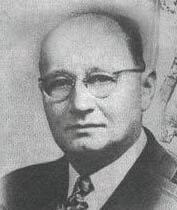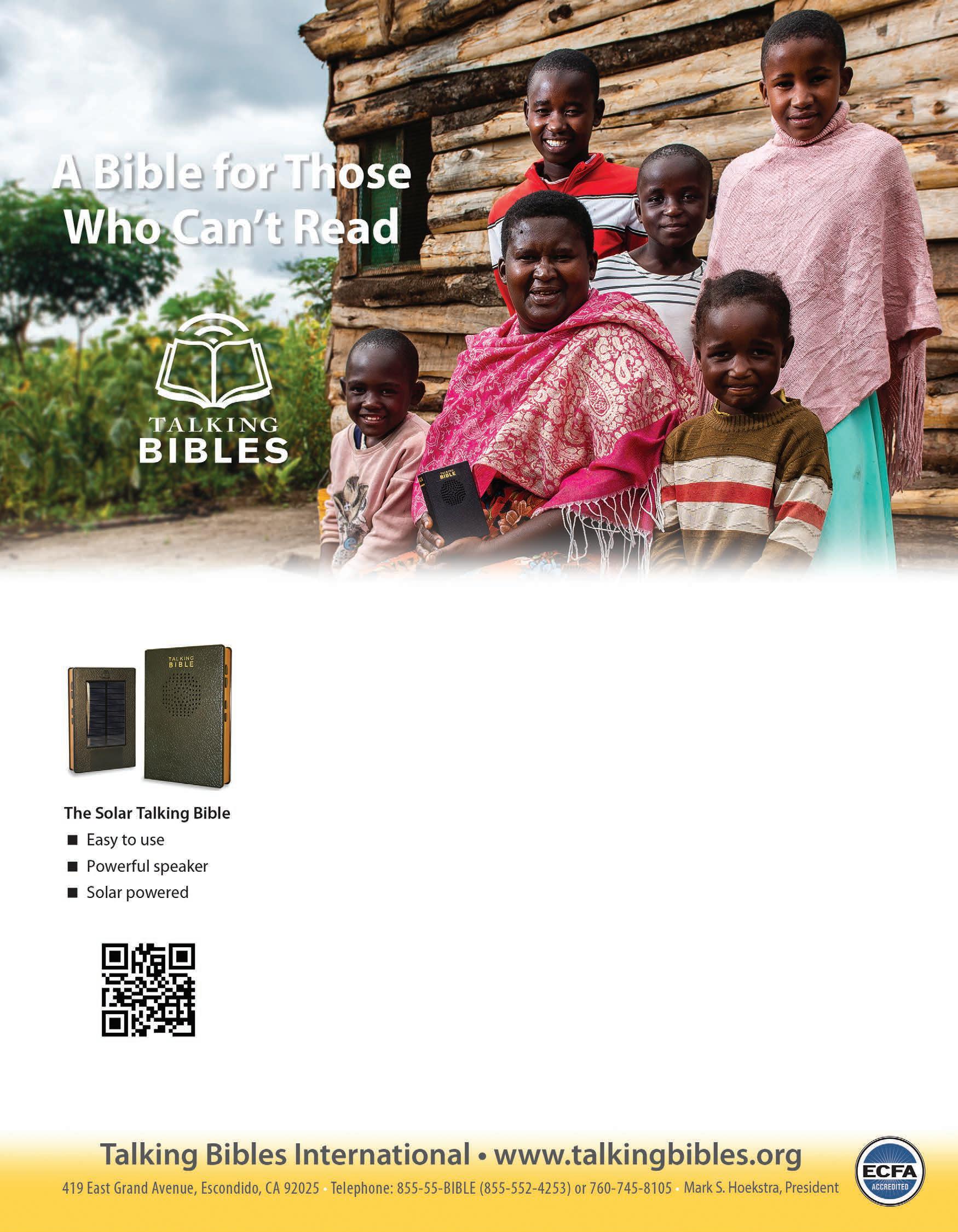Outlook The
MAR/APR

2
73 YEARS: 1951 – 2024
reformedfellowship.net
2024 DEDICATED TO THE EXPOSITION AND DEFENSE OF THE REFORMED FAITH

THEREFORE if any man be IN CHRIST, HE IS A NEW CREATURE: old things are passed away; BEHOLD, ALL things are BECOME NEW.
–2 Corinthians 5:17

A Risen Savior | Considering Zion with Jodocus van Lodenstein: A Spirit of Reform Correspondence from Scotland | The Certainty of Christ’s Resurrection | The Wonder of Woman
An Alien Among Aliens | Meditation: I Believe in Jesus Christ | God’s Son Is Our Lord
Can You Believe in the Virgin Birth? | Church Order Articles 17 and 18
What Is the Greatest Threat to Reformed Christianity Today? | Good Question Five Thoughts for Prison Inmates | After Darkness, Light | Book Reviews
VOLUME
74 ISSUE
3 | A Risen Savior
Mr. Cornelius VanKempen
Jesus is alive, and His word is to go into every part of the world bringing the tidings that sin has been put to death, and through His death He earned eternal life for the vilest sinner.
4 | Considering Zion with Jodocus van Lodenstein: A Spirit of Reform (2)
Mr. Michael R. Kearney
The second in a study series on Dutch minister Jodocus van Lodenstein’s book about the spiritual state of Reformed churches in the seventeenth century.
7 | Correspondence from Scotland
Dr. Zachary Purvis Correspondence from Edinburgh Theological Seminary (ETS).
8 | The Certainty of Christ’s Resurrection
H. J. Kuiper
True Christianity stands and falls with the resurrection of Christ. It is the central fact of the Christian religion. Since it is absolutely essential to our salvation, we must have irrefutable proof that Jesus’ resurrection was a fact.
11 | The Wonder of Woman
Rev. Peter H. Holtvlüwer
The relationship between husband and wife is under scrutiny like never before. What does the creation account teach us about this? How are we to think of the concepts of authority and submission within marriage?
14 | An Alien Among Aliens
Mrs. Elisabeth Bloechl
What does it look like to minister as an alien among aliens; and what does the cross have to do with it?
16 | Meditation: I Believe in Jesus Christ (2)
Rev. George van Popta
This brief meditation accompanies a new hymn based on the first part of Article 2 of the Apostles’ Creed, “I believe in Jesus Christ,” and then as this confession is further explained in Lord’s Day 11 and 12 of the Heidelberg Catechism.
18 | God’s Son Is Our Lord
Rev. William Boekestein
Heidelberg Catechism, Lord’s Day 13, Q&A 33 and 34.
20 | Can You Believe in the Virgin Birth?
Rev. William Boekestein
Heidelberg Catechism, Lord’s Day 14, Q&A 35 and 36.
22 | Church Order Articles
17 and 18
Rev. Greg Lubbers
Article 17: The Matters and Manner of Assemblies.
Article 18: Prayer in Assemblies.

24 | What Is the Greatest Threat to Reformed Christianity Today?
Dr. Jeff Doll
Today we hear many alarms sounding, warning us of the danger of the multitude of antithetical philosophies finding their way into the visible church. Are most of them a threat to conservative confessional Reformed believers and congregations? A Reformed biblical counselor who has served the Reformed community for over two decades will interact with that question in this article.
27 | Good Question
Rev. William Boekestein
Good Question 46: What is the Great Commission?

28 | Five Thoughts for Prison Inmates
Dr. Joel R. Beeke
Considering five truths about God— His holiness, justice, grace, love, and sovereignty—calling unbelieving inmates by God’s grace to be reconciled with God through repentance and faith in Jesus Christ, while providing encouragement to find joy, peace, and comfort in the love, mercy, and sovereignty of our covenant God. For those in prison and outside prison.

34 | After Darkness, Light
Rev. Daniel Lobo
As God worked through real people in the time of the Reformation to bring about a return to Scriptural authority, so today He calls every Christian to pursue an ongoing Reformation under the same authority, shining the light of truth in a darkened world
36 | Book Reviews
Rev. Jerome Julien
The Reformed Lord’s Supper Form. A Commentary - Bastiaan Wielenga, The Savior’s Farewell: Comfort from the Upper Room - Martyn McGeown
Mrs. Hope Staal
Patrick of Ireland - Simonetta Carr
Cover: Macro flower photography and composition/design by Jeff Steenholdt.
Contents | March/April | Volume 74 | Issue 2
The Outlook | 2


Why do all four of the Gospel writers write about the sufferings and death of the Lord Jesus Christ with such clarity and completeness? The Old Testament sacrifices pointed to the coming of the Lamb of God. The prophets and Jesus Himself spoke about it often: Jesus, the Son of God, would come to satisfy the justice of God. Death was a necessity because the penalty for sin is death. “And she shall bring forth a son, and thou shalt call his name Jesus: for he shall save his people from their sins” (Matt. 1:21). A perfect and holy God took upon Him human flesh, the just for the unjust. “Behold, we go up to Jerusalem; and the Son of man shall be betrayed unto the chief priests and unto the scribes, and they shall condemn him to death, and shall deliver him to the Gentiles to mock, and to scourge, and to crucify him: and the third day he shall rise again” (Matt. 20:18–19).
We see the heinousness of sin and the terrible price that needed to be paid.
 Mr. Cornelius VanKempen
Mr. Cornelius VanKempen
known as Case, has been married to Susan for fifty-eight blessed years. They attend and are members of Heritage Reformed Congregation in Grand Rapids, MI.
And the angel answered and said unto the women, Fear not ye: for I know that ye seek Jesus, which was crucified. He is not here: for he is risen, as he said. Come, see the place where the Lord lay.
–Matthew 28:5–6, KJV
To die the death was not enough because the payment had to be approved and accepted. This required a resurrected Savior. Calvary’s cross is the place where sinners go to be cleansed from every sin. The empty tomb is the guarantee of His people’s eternal salvation. “Blessed be the God and Father of our Lord Jesus Christ, which according to his abundant mercy hath begotten us again unto a lively hope by the resurrection of Jesus Christ from the dead, to an inheritance incorruptible, and undefiled, and that fadeth not away, reserved in heaven for you, who are kept by the power of God through faith unto salvation ready to be revealed in the last time” (1 Pet. 1:3–5). All sorrow becomes joy as Jesus Christ has risen from the grave of sin for every one of His elect people. “O death, where is thy sting? O grave, where is thy victory?
The sting of death is sin; and the strength of sin is the law. But thanks be to God, which giveth us the victory through our Lord Jesus Christ” (1 Cor. 15:55–57).
This is the good news: Jesus is alive, and His word is to go into every part of the world bringing the tidings that sin has been put to death, and through His death He earned eternal life for the vilest sinner. “Therefore if any man be in Christ, he is a new creature: old things are passed away; behold, all things are become new” (2 Cor. 5:17). Have you sought this risen Savior and in your seeking been found of Him?
“The man who once has found abode within the secret place of God shall with Almighty God abide, and in His shadow safely hide”
(Psalter 248:1).
Mar/April 2024 | 3
THE
CERTAINTY OF CHRIST’S RESURRECTION

“Christ Is Risen! Hallelujah!”
This is the triumphant song of every Bible-believing Christian, not only on Easter Sunday but on every Lord’s Day and whenever his thoughts turn to the foundation of his faith.
But can we believe Christ’s resurrection without the slightest tinge of doubt? Can we be absolutely sure of it?
It is of the utmost importance to know that the resurrection of Christ is an indubitable fact. We cannot have true comfort if there is any room for doubt that Jesus Christ rose from the dead, as he promised, and that his body, once mortal, is now clothed with immortality and heavenly glory.
 Rev. H. J. Kuiper
Rev. H. J. Kuiper
The Outlook | 4
We are reminded of the words of Paul in 1 Corinthians 15, the great chapter on the resurrection: “if Christ hath not been raised, then is our preaching vain, your faith also is vain. Yes, and we are found false witnesses of God; because we witnessed of God that he raised up Christ . . . and if Christ hath not been raised, your faith is vain; ye are yet in your sins.” If Christ had failed to rise from the dead the inescapable conclusion would be that he had failed to pay in full the price of our sins.
True Christianity stands and falls with the resurrection of Christ. It is the central fact of the Christian religion. Since it is absolutely essential to our salvation, we must have irrefutable proof that Jesus’ resurrection was a fact.
It is significant that in the Gospels very few words are devoted to the resurrection as such. They offer no description of the manner in which that tremendous miracle took place. We do not even read: “At that moment Jesus became alive and left the tomb, clothed with a glorified body.” All the emphasis falls on what happened after his rising was an accomplished fact. Perhaps God judged that the miracle as such was too sacred for human eyes to behold. We are more sure that even if it had been witnessed it could not have been understood and described. Miracles defy analysis just because they are miracles. The only thing that is important to know is that Christ really conquered death, and for that reason all stress is placed in the sacred record on our Lord’s appearances to his disciples. Note how Luke accents their significance in Acts 1:4; “to whom (the apostles) he also showed himself alive, after his passion, by many proofs, appearing unto them by the space of forty days, and speaking the things concerning the kingdom of God.” Perhaps what is said about the forty days
mentioned here justifies the conclusion that Christ appeared to his disciples daily, hence more often than is indicated in the record.
The Resurrection Appearances
In reading what the Gospels have to say about the events of those last forty days of our Lord’s life on earth, we perceive that the Lord determined to convince the apostles, who were to be his witnesses, of the absolute certainty of his resurrection. Not fewer than eleven post-resurrection appearances are recorded. These were as follows: 1) to the women among his disciples who went to the tomb early Sunday morning to anoint his body; 2) to Simon Peter; 3) to Mary Magdalene; 4) to the ten disciples on that first Sunday evening, Thomas being absent; 5 ) to the two men of Emmaus; 6) to the eleven apostles, Thomas now being present; 7) to seven of them at the sea of Galilee; 8) to more than 500 brethren at once, somewhere in Galilee; 9) to James, his brother according to the flesh; 10) to his disciples at his ascension from the mount of Olives; 11) to Paul, after the ascension, as to one untimely born.
Much could be said about these appearances. We call attention to only three things.
First, the Lord appeared first of all to the women, whose intuition and simple faith grasped the tremendous truth of their Lord’s resurrection when the cautious, hard-headed apostles were not yet ready to receive the glad tidings. We imagine the latter saying: “Those credulous women! They have been imagining things. We may as well realize that Jesus is dead and that our cause is lost.”
Second, the Lord left no stone unturned to convince unbelieving Thomas, who would not even consider the possibility that Christ was risen, of the reality of the Lord’s resurrection and resurrection body.
Third, Christ first showed himself to few and then to many. There is progress in this and in other respects as well, each appearance paving the way for those that follow. Christ did not ascend to heaven until all his witnesses were immovably convinced that he had risen from the dead and that he was now living on a higher, essentially heavenly plane.
What the Skepticism of the Apostles Means for Our Faith
Once I heard of a resurrection sermon in which the preacher contended that the disciples confidently expected their Lord to rise from the dead, seeing he had promised this as often as he had foretold his cruel death on the cross. There is nothing in the record to support that contention. On the contrary, it is evident from their attitude when he was condemned and crucified and after he had died that the disciples were a disconsolate and disillusioned group. Even the women did not give a moment’s thought on Sunday morning to the possibility that his body might no longer be in the grave. They wondered who would move the stone for them.
Note also the skepticism with which the apostles greeted the message of the women. We read in Mark 16 that those who had been with him mourned and wept and disbelieved when they heard that he was alive and had been seen of Mary Magdalene. Later, when Christ was in their midst, “he upbraided them with their unbelief and hardness of heart, because they believed not them that had seen him after he was risen.”
It is not easy to explain the skepticism of the apostles. We can scarcely imagine that the three predictions of Christ, when he was still alive, that he would rise from the dead the third day, had been forgotten completely by all the
Mar/April 2024 | 5
disciples. Yet it seems not to have registered with them. The very idea of a suffering and dying Messiah was wholly out of line with their carnal conception of his kingdom. Since there was no room in their theology for a suffering and crucified King, the idea of a resurrection did not fit in with it either. No wonder the prediction that he would rise the third day did not impress them! It afforded them no comfort during the awful suffering of Golgotha and the gloom of the three sad days when he was dead.
But let us not fail to consider that the very unbelief of the apostles, sinful though it was, adds immeasurably to the value of their subsequent testimony that Christ had truly been raised from the dead. Their conviction on this point could not have been the fruit of wishful thinking, of an overwrought imagination. The last thing they expected was that Jesus would rise and that in heavenly glory. Their grief and despair, the extreme reluctance with which they gave credence to the various reports that their Lord had been seen alive, the dejection of the two men of Emmaus, and the eclipse of their faith as revealed in their melancholy words to Jesus: “We hoped that it was he who should redeem Israel”—all this indicates that when the disciples finally were convinced that the Master had risen, it was because they could not but accept the overwhelming evidence of the reality of that glorious event.
Our implicit faith in the fact of the resurrection rests on the testimony of the apostles. John says in his first epistle: “That which was from the beginning, that which we have heard, that which we have seen with our eyes, that which we beheld, and our
hands handled, concerning the Word of life . . . declare we unto you also, that ye also may have fellowship with us.” Our faith is a reasonable faith because it is supported by the witness of reliable men, whose testimony bears the earmark of truth and sincerity. Do we know that Christ lives only because he lives in our hearts, as a certain popular hymn has it? To be sure, the Spirit testifies in our hearts that Christ is a living Christ, and we are assured that Christ lives within us, but that mystical assurance would be quite ineffectual without the intellectual certainty of his resurrection, based on the testimony of many witnesses. It has often been said that the resurrection of Christ is the best attested fact of history.
A final thought. Our faith in the fact of the resurrection, though based on the testimony of eye and ear witnesses, is connected with our belief in the Bible as the infallible Word of God. We cannot be absolutely sure of the testimony of those witnesses unless we can be sure of the absolute veracity and infallibility of the Word of God which contains their testimony. We must be as sure of the complete reliability of the written record as of the dependability of the witnesses whose testimony it conveys to us. And we are sure. We have not only the witness of the Bible itself but we also have the testimony of the Spirit. Of this our Confession speaks in article 5: “believing without any doubt all things contained in them, not so much because the Church receives and approves them as such, but more especially because the Holy Spirit witnesses in our hearts that they are from God, and because they carry the evidence thereof in themselves. For the very blind are able to perceive that the things foretold in them are being fulfilled.”
This article was located by doing a simple word search using “resurrection” in the Archives section of the Reformed Fellowship website. Try it out using your own search “words” for an article of interest to you!
Archive publication date: July 2021, Author: Kuiper, H. J. | Category: Timely Topic | Volume: Vol. 8, Issue 10 (1959)
Rev. H. J. Kuiper
“H. J.” served as editor of The Banner This he did in a part-time capacity when he began his ministry of Neland Avenue in 1929. For fifteen years, he functioned in both capacities. In 1944, he became the first full-time editor and continued in this ministry until 1956, the time of his retirement. His editorial talent also involved other publications: The Witness and The Reformed Herald. In the period of his retirement, Rev. H. J. Kuiper was appointed managing editor of the Torch and Trumpet, in which capacity he functioned until the day of his death. He also served as an editor of the Psalter Hymnal.
Denominational activities included serving as delegate to synod eight times (in 1936 and 1937 he served as president); member of the Chicago Board of City Missions; and chairman of the Grand Rapids City Mission Board for fifteen years. He also served as second president of the Young Men’s Federation; first president of Grand Rapids Christian High School board; and member of the board of trustees of Calvin College and Seminary.
A colleague wrote, “Rev. H. J. Kuiper deserves to be remembered as a man who spoke and wrote in the full conviction that what he expressed was in accordance with the Word of God and was for the spiritual welfare of our church.”
Henry J. Kuiper passed away due to illness on December 23, 1962, in Grand Rapids, Michigan.
The Outlook | 6
The Wonder of Woman
By now it has become clear that God’s creating woman to be man’s helper is a great honor for her as much as it is a great blessing for the man. A helper provides what the other urgently needs, and so a helper is highly regarded and deeply appreciated. Since the Lord is the ultimate Helper of His people, the woman is to be esteemed as an extension of His help to the man.
But there is more to this relationship than merely solving a lack in man, something indicated by the manner in which the Lord created the woman. The Lord could have chosen any method to create her. He could have formed a second pile of dust and repeated what He had done with the man. Or He might have simply spoken a word to make her instantly appear. Instead we read, “So the Lord God caused a deep sleep to fall upon the man, and while he slept took one of his ribs and closed up its place with flesh” (Gen. 2:21, English Standard Version). Why did God do things this way?
Dependence and Distinctions
One reason is to teach us that man and woman, husband and wife, are so intimately connected that they are dependent on each other. As much as a man needs a woman, so a woman needs a man, for she comes from man and is designed to support a man. If we need to guard against male sexism in our time so we also need to guard against feminism. Feminism teaches that women are totally independent of man, can be happy and content on their own, and are in no way bound to men.1 The idea is that women are free to serve themselves, but the Bible says that
the Lord made woman to be a helper suitable for man. Woman’s existence is intricately connected to man—she literally is born out of the man (in a unique way, to be sure) just as later men will be born out of women. God created her out of man and for man, to bless him as his complement and co-worker in subduing creation. Any twisting of that will not lead to peace and contentment but to unrest and bitterness.
Still there is more to God’s design. Inside of this mutual dependence is a divine ordering of the relationship. The Lord chose to first make the man and only later the woman. The
 Rev. Peter H. Holtvlüwer
Rev. Peter H. Holtvlüwer
Meditation Text: Genesis 2:21–23
Suggested Reading: Proverbs 31:10–31
Lord set Adam alone in the garden and gave him the command to work it and keep it. By God’s design, the woman did not yet exist when Adam received instruction about the tree of the knowledge of good and evil. God also gave to Adam while alone the royal task of naming the animals. Clearly, Adam was meant to later teach and explain these things to his wife.
What does all this show? It shows that God made man to be head of his wife and woman to follow the guidance of her husband. There was a time when Adam was the only human alive, the one whom God set in charge of the garden and the animals. Adam is the one God created as His representative king over creation and head of the entire human race (Rom. 5:12). When God creates from Adam’s rib a woman to be his wife then she certainly joins him in exercising authority over the world as God commanded them both in Genesis 1:28, but at the same time she too comes under his
Mar/April 2024 | 7
If you are a husband, your calling is to cherish your wife as a precious gift from God, gladly providing her with what she needs so that she can fully be the uniquely suited helper whom God made for you.
authority. To be sure, they both hold equal worth in God’s eye as both are created in God’s image, but God distinguishes their roles by giving Adam the responsibility that comes with authority. The buck stops with Adam. Eve is to help him in every way, and Adam is to seek her aid and cherish her as God’s gift to him, but in the end Adam is the responsible authority figure in the marriage. Adam shows his authority by naming his God-given helper, calling her first “Woman” and later “Eve” (Gen. 2:23; 3:20). The Lord Himself confirms Adam’s headship by first addressing the man in the wake of the couple’s fall into sin (3:9).
Authority and Cherishing
In our current cultural setting it will be hard to maintain the truth of a husband’s authority over his wife, but if we want to stay faithful to God we must. This truth has implications as well for how we do church, as the Holy Spirit makes clear through Paul: “I do not permit a woman to teach or to exercise authority over a man; rather, she is to remain quiet. For Adam was formed first, then Eve” (1 Tim. 2:12–13). Elsewhere Paul writes that a woman ought to have a sign of authority on her head. “For man was not made from woman, but woman from man. Neither was man created for woman, but woman for man” (1 Cor. 11:8–9). There is an unmistakable God-ordained difference in roles: man has authority over his wife as her head and this in turn affects the roles men and women may undertake within the body of Christ.
A husband’s authority, however, is never to be demeaning, damaging,
or abusive but always respectful, edifying, and for the flourishing of the wife. That’s how God intends all authority to function. Just as it is an appalling thing to see governments or parents misuse their authority to the detriment of their citizens or children, so it is appalling to see a husband do so toward his wife. However, the abuse of authority does not mean authority itself is a bad thing. Authority remains a good thing when it is used as the Bible teaches: not to oppress but to bless. God teaches not powerhungry domination but servant-like headship; not husbands lording it over their wives and ordering them around, but husbands loving their wives as their own bodies and caring for them with tender compassion just as Christ cares for His bride. Though Jesus is the church’s Lord, He became a slave in order to save her, and this is the model for husbands (Eph. 5:25–28). The church despised Him but nevertheless He sacrificed for her benefit. He has authority over her, but He is never rough, abusive, or neglectful, but always kind, gentle, and attentive. Christ treats His bride like His own body, in purity of love, and that’s how every husband should treat his wife.
Doesn’t God show that too when He makes the woman out of Adam’s own rib? For what the Lord presented to Adam after he awoke was not some creature remote from himself. What the Creator brought was a living being made from Adam’s own flesh, as he joyfully acknowledges: “This at last is bone of my bones and flesh of my flesh” (2:23). How could Adam ever demean his wife, his own flesh? How could a husband who knows
this truth ever treat his wife badly? It would be as foolish and sinful as harming himself. If you are a husband, your calling is to cherish your wife as a precious gift from God, gladly providing her with what she needs so that she can fully be the uniquely suited helper whom God made for you.
Thriving Wife
If a husband’s authority is not to be oppressive, and if a wife submitting to her husband is not to be drudgery, what does this look like in real life? The Holy Spirit gives us a picture of this godly marriage in Proverbs 31 where first the “excellent wife” comes into view. And what is life like for her? Is she being told by her husband to clean the house, do the laundry, have dinner on the table when he gets home, and for the rest keep quiet? Far from it! Instead we read, “The heart of her husband trusts in her, and he will have no lack of gain” (v. 11). The excellent husband trusts his excellent wife. He doesn’t micromanage her life. He’s not looking over her shoulder at every penny she spends. To say it in today’s terms, he gives her access to the bank account and the keys to house and car with the full conviction that she will manage it all well. Husband, do you trust your wife like that? Do you give her room and encouragement to be the good helper to you God meant her to be? Do you pray for her and with her?
For the good wife is energetic and active in managing the household. “Like the ships of the merchant . . . she brings her food from afar” (v. 14). On the one hand she “provides food for her household and portions for her maidens” but on the other hand she “considers a field and buys it; with the fruit of her hands she plants a vineyard. She dresses herself with strength and makes her arms strong” (vv. 15–17). This woman is happy and thriving in her
The Outlook | 8
“This at last is bone of my bones and flesh of my flesh; she shall be called ‘Woman,’ because she was taken out of Man.” He’s virtually singing his joy and wonder!


home. With her husband’s blessing, she eagerly takes up responsibility to provide for her family and even improve their circumstances. Not only is she a mother caring for children but she’s a fellow worker with her man, to assist and help him by managing the affairs on the home front while he is busy elsewhere subduing the earth in his daily labor. Wives, do you see how vital a role you play in helping your husband? Do you take pleasure in running your homes well so that your husband is enabled to do his work?
Perfect Match
For notice that after God formed the woman from Adam’s rib, “he brought her to the man.” It was a beautiful moment: the Father in heaven giving away His own daughter. And He
gave her to the man. There is order here once again. The man is not brought to the woman but she to him. Like the wife in Proverbs 31, she is meant to be for her husband, as a precious helper.
And Adam knows what a blessing she is: “This at last is bone of my bones and flesh of my flesh; she shall be called ‘Woman,’ because she was taken out of Man.” He’s virtually singing his joy and wonder! A little earlier, God had led him to understand that his aloneness is not good and that among all the animals he’s just named there was no match for him. And now he is presented with a special act of God’s grace in forming the one he so badly needed—the woman. What a wonder!
Husband, honor and cherish your wife as helper. Wife, respect and cherish your husband as head. This is your Creator’s design and will, within which you can expect His rich blessing.
1 It’s important that we do not neglect the fact that singles can be happy and content on their own when God leads them into or keeps them in that state. Far too often the singles feel a bit lost in the church. They too love and value marriage and the family and they too lament the destruction of the family in western culture, but their singleness seems to be overlooked.
Rev. Peter H. Holtvlüwer
is minister of Ancaster Canadian Reformed Church (ON) and editor of Christ’s Psalms, Our Psalms.
Mar/April 2024 | 9
YES! I want to surprise a friend with a gift subscription to Outlook The
Order today: online: www.reformedfellowship.net, email: office@reformedfellowship.net by phone: 616-532-8510 or use this form to mail to Reformed Fellowship. n One year print subscription: n U.S.–$30.00 | n Canada–$38.00 | n Foreign–$36.00 n One year digital download subscription: $12.00 - (Included FREE with print subscription!)
Ordered by: Name Address
My home church
Check, money order ( U.S. funds), or credit card
Expiration date Signature required
Outlook gift subscription for:
I would like to sign up for special news and promotions.
My Email is MAKE A DONATION
My donation of $ is enclosed is for: n The General Fund n The Outlook
n Prison Ministry n Book Fund THANK YOU FOR YOUR SUPPORT
Your donations are tax deductible. Reformed Fellowship is a 501(c)3 charitable organization.
For additional subscriptions use a copy of this order form or a separate sheet of paper.
(ISSN 8750-5754) (USPS 633-980)
“Exhorting you to contend earnestly for the faith which was once for all delivered to the saints.”
—Jude 3
Journal of Reformed Fellowship, Inc.
Send all copy to:
Editor, Dan Van Dyke
3718 Earle S.W. Grandville, Michigan 49418
Email: djvan1951@gmail.com
Website: www.reformedfellowship.net
Board of Trustees
Al Rumph, President; Rev. Casey Freswick, Vice President; Rev. Doug Barnes, Secretary; Dr. Andrew Compton, Marv Mingerink, Treasurer; Vice-all; Glenn Hop, Michael Kearney, Tom Kooienga, Dr. Brian Najapfour, Dr. Daniel Ragusa, Rev. Mark Vander Hart, and David Vander Meer, Directors
Editor: Dan Van Dyke
Contributing Editor: Dr. Cornelis P. Venema
General Manager: Hope Staal Manager's Assistant: Emily Postma
Art, Design & Production: Jeff Steenholdt
This periodical is owned and published by Reformed Fellowship, Inc., a religious and strictly non-profit organization composed of a group of Christian believers who hold to the biblical Reformed faith. Its purpose is to advocate and propagate this faith, to nurture those who seek to live in obedience to it, to give sharpened expression to it, to stimulate the doctrinal sensitivities of those who profess it, to promote the spiritual welfare and purity of the Reformed churches and to encourage Christian action.
The publishers of this journal express their adherence to the Calvinistic creeds as formulated in the Belgic Confession, the Heidelberg Catechism, the Canons of Dort, and the Westminster Confession and Catechisms.
Reformed Fellowship holds the copyright to all material published in this magazine. All contributions represent the personal views of the writers and do not necessarily reflect the opinions of the members of Reformed Fellowship, Inc.
Subscription Policy
The Outlook (USPS 633-980) is published six times per year (bi-monthly) by Reformed Fellowship, Inc. Annual subscriptions are $30.00 per year in the United States; outside the US, $36 per year (foreign subscribers please remit payment in US Funds; Canada add GST). Digital download subscriptions are $12 annually, and are included FREE with a print subscription. Unless a definite request for discontinuance is received, it is assumed that the subscriber wishes the subscription to continue without the formality of a renewal order and he will be billed for renewal. Anyone desiring a change of address should notify the business office as early as possible in order to avoid the inconvenience of delayed delivery. Zip code should be included. Periodical postage paid at Grandville, MI and at additional mailing offices.
POSTMASTER:
Send address changes to The Outlook, 1988 140th Avenue, Dorr MI 49323
Advertising Policy
1. The Outlook cannot accept announcements or advertising copy inconsistent with the stated purpose of RFI. All advertisements and announcements must be approved by the RFI board prior to publication. We reserve the right to reject, edit, or request resubmission of announcement text or advertising copy. Books, pamphlets, or CDs to be advertised are to be screened as to author and content prior to publication of the advertisement, and such material should not conflict with the stated purpose
of RFI. We reserve the right to limit the size of all announcements and advertisements, and to limit the number of issues in which they appear.
2. All advertisements or announcements are to be submitted via email to office@reformedfellowship.net or to the business office at 1988 140th Avenue, Dorr MI 49323, and must be received at least two months before the publication date.
3. Fees for B&W/grayscale ads: $190 for full-page, $115 for half-page, $65 for quarter-page.
4. Fees for full-color ads: $235 for full-page, $140 for half-page, $80 for quarter-page.
5. Fees for preparing artwork for ads (in addition to advertising costs above) are $140 for full-page, $115 for half-page, $90 for quarter-page. These fees are waived if advertising art is print-ready. Please submit manuscript in an email or as an MS-Word.doc attachment. If you have pictures or images, please include as JPG files.
6. Preferred final file format for print-ready ads: High Quality Print PDF.
7. Ad sizes specifications:
8.75 x 11.25, trim 8.5 x 11"
Full page non-bleed: 7.25 x 9.75"
Half page horizontal bleed: 8.625 x 5.25"
Half page horizontal non-bleed: 7.25 x 4.5"
Quarter page (non-bleed) 3.5 x 4.5"
8. This Advertising Policy supersedes all prior policies, resolutions, or other statements.
Editorial Office
Dan Van Dyke
3718 Earle S.W. Grandville, Michigan 49418
Email: djvan1951@gmail.com
Circulation Office
1988 140th Avenue, Dorr MI 49323
(616) 532-8510
Business Mailing Address
1988 140th Avenue, Dorr MI 49323
Email: office@reformedfellowship.net
Phone
City/State/Zip
Name Address City/State/Zip Phone Email
address METHOD OF PAYMENT
Card
#
The Outlook | 10


Dorr, MI 49323
(616) 532-8510

MENTAL HEALTH & SOUL CARE
CONSIDERED BIBLICALLY, PASTORALLY, & PRACTICALLY

Brian G. Najapfour & Paul W. Wagenaar
Paperback | Approx. 225 pages
This compilation of essays by various authors –theologians, pastors, counsellors, and laypersons –originated at two conferences in Jordan, Ontario in 2022. Reformed Fellowship is very glad to now make this material accessible in written form. Speaking often from first-hand experience, the authors address a variety of issues and collectively call for a Biblically holistic approach to body and soul in relationship to mental health. This will make an invaluable resource for all seeking a better understanding of what the Bible has to say on this timely topic.
TABLE OF CONTENTS PREVIEW
n A Biblical Theology of Sickness
Dr. Brian G. Najapfour
n Post-Covid Effects on Mental Health
Dr. Mark Kelderman
n Christian Wholeness
Dr. Mark Kelderman
n Depression: A Historical & Biblical Outlook
Dr. Brian G. Najapfour
n Casting a Light on Depression
Rev. Jeremy Dykman
n Overcoming Anxiety
Mr. Glen Slingerland
n Burnout
Rev. Bartel Elshout
n Understanding Bipolar Depression
Rev. Pieter VanderMeyden
n Helping Women Through Mental Health Challenges
Ms. Lynn Murray
n Helping Your Child Deal With Fear & Anxiety
Mrs. Sarah J. Najapfour
n Seeing Your Mental Health Struggle as a Divine Gift
Mr. Michael Short
n My Mental Health Journey: Anxiety, Depression, & PTSD
Mr. Michael Brouwer
n Walking Alongside Someone With Anxiety or Depression
Mr. Glen Slingerland
Reformed Fellowship, Inc.
1988 140th Avenue
COMING SOON!
$10 PREORDER SPECIAL TO PRE-ORDER, PLEASE... VISIT www.reformedfellowship.net EMAIL office@reformedfellowship.net OR CALL 616.532.8510








 Mr. Cornelius VanKempen
Mr. Cornelius VanKempen


 Rev. H. J. Kuiper
Rev. H. J. Kuiper
 Rev. Peter H. Holtvlüwer
Rev. Peter H. Holtvlüwer





